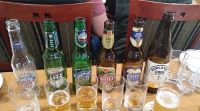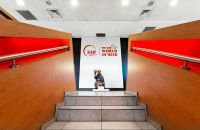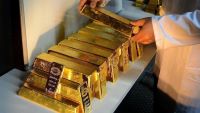How Beer Saved the World
Posted on May 25, 2019 by Fred Hoyt
May 17, 2019 Sandton City, South Africa
How Beer Saved the World was not a term paper turned in (year after year) by the Sigs, although I know several who might have penned the original. Instead, it was our introduction to “The World of SAB Beer” museum, belonging to the newest member of the InBev global empire. The museum spoke more generally about the origins of beer (the Save involved the 
 Egyptians, who initially developed the drink) than it did about SAB. While there was an African libation made with sorghum (we were given a sample in the mock up of an African village), the Castle brand—still made today—originated in the gold rush around Johannesburg in the late 19th century. Interestingly enough, Blacks could not buy the beer legally until the 1960s, but a thriving social community invented the shabeen, a saloon in a house (as part of apartheid, Blacks were segregated into townships), where African jazz developed.
Egyptians, who initially developed the drink) than it did about SAB. While there was an African libation made with sorghum (we were given a sample in the mock up of an African village), the Castle brand—still made today—originated in the gold rush around Johannesburg in the late 19th century. Interestingly enough, Blacks could not buy the beer legally until the 1960s, but a thriving social community invented the shabeen, a saloon in a house (as part of apartheid, Blacks were segregated into townships), where African jazz developed.
SAB has a footprint in Africa, which is part of the reason InBev bought it. This is a great place to do business if you can navigate the drama, and SAB seems to have done so. We saw exhibits involving the growing of hops and barley and malt—I think my fraternity lads would have treasured every moment, though they might have been impatient for the taste test. The exhibits also included a gold mine (so you could see why miners were thirsty), a pub, and several huge copper pots. The major change we saw was the availability in the gift shop of Budweiser, Stella Artois, and Corona mementos, in addition to the local brews.
The other business visit was one of my favorites three years ago, to  AngloGold Ashanti. The company is the biggest in Africa, and one of the top three in the world. Headquartered in Johannesburg, it’s in the process of putting its last mine (“you’re sitting on it,” he said) up for sale. South Africa, he reminded us, has been responsible for 2/3 of the gold in the world. Today, however, AngloGold has operations in Australia, Latin America, elsewhere in Africa, and is eying projects in Minnesota and Nevada. 27,000 employees work for the company, though the days of cheap labor are long gone. Our faculty guide pointed out that to get mine workers, the government ordered Blacks to pay a new tax in hard currency, which broke the agricultural economy and weakened family structures in Africa as the men moved to the cities to work in the mines. Unions came in the late 80s as an important part of the struggle to end apartheid, and he said personally he was glad to be able to negotiate with a union rather than 27,000 employees.
AngloGold Ashanti. The company is the biggest in Africa, and one of the top three in the world. Headquartered in Johannesburg, it’s in the process of putting its last mine (“you’re sitting on it,” he said) up for sale. South Africa, he reminded us, has been responsible for 2/3 of the gold in the world. Today, however, AngloGold has operations in Australia, Latin America, elsewhere in Africa, and is eying projects in Minnesota and Nevada. 27,000 employees work for the company, though the days of cheap labor are long gone. Our faculty guide pointed out that to get mine workers, the government ordered Blacks to pay a new tax in hard currency, which broke the agricultural economy and weakened family structures in Africa as the men moved to the cities to work in the mines. Unions came in the late 80s as an important part of the struggle to end apartheid, and he said personally he was glad to be able to negotiate with a union rather than 27,000 employees.
The speaker talked about sustainability—in a way that initially surprised me. “Sustainability,” he suggested, “is not what you do with money, its how your make your money.” Bear in mind he’s in a business that is dangerous and certainly under fire from activists. As he noted, everyone wants the iPads and cars and other goods made from metals, but “not in my back yard.” He showed us a list of projects that were either cancelled, delayed, or put on permanent hold. Hence, the mining industry has had to factor sustainability into its thinking. He talked especially about working with communities as the key to the mining industry. Another challenge was to make sure the revenue went to improve society, rather than lining the pockets of politicians (today’s local newspaper had a letter to the editor questioning whether there were any honest politicians in South Africa).
He did make one point, though, that I hadn’t considered, and I’ll have to work it into my strategy class…the prevalence of funds that invest in companies that are sound on Environment, Society, and Governance (ESG). I think he mentioned something like 7 trillion dollars at stake. And if you don’t qualify, the cost of capital (interest on borrowing) moves upward. His conclusion was that’s the only way companies will respond to ESG activists. Interesting perspective! He was one of my favorites this year, too.
It was interesting reading the section on sustainability. It is a unique way of looking at something that is thought about on a daily basis. This way of thinking totally makes sense and using that when thinking about what to do with the mines could really bring new ideas to the table.
The museum in South Africa were expressing the origins of beer more than SAB Beer which was interesting. Also, Black people could not legally purchase beer until the 1960’s. Great info to hear that SAB survived the drama of going into doing business in South Africa. There were also other brews that were sold in the museum gift shops than the local brews. With the gold mine topic reoccurring, to get sufficient amount of mien workers, the black people had to pay an entirely new tax. Wow. This lead to a weakened economy. The quote mentioned about the speaker discussing sustainability, is important and was interesting to read. It was important that the revenue was going towards improving the public.
I found it really cool that you had the opportunity to try some Castle brand beer, it’s crazy to think that it was first brewed in the 19th century. It was interesting that you mentioned the gift shops having big brand beer merchandise, because I wouldn’t think of slower economic growing countries to be the ones bringing in a lot of big brands.
I think the marketing that was going in with the other big beer brands was interesting, showing the global reach of the company. I did not know that so much gold comes from that region and it is responsible for 2/3 of the worlds gold. That seems like a remarkable number to me. Lastly I thought it was interesting how much money, 7 trillion dollars, was at stake for ESG. That much money will surely make these companies want to operate by the standards that are laid out by ESG.
I also thought it was very interesting to read about your comments on Castle brand beer. It was also interesting to learn about how the brand originated in the gold rush. I didn’t realize what the mining company went through to get workers. Maybe beer actually did save the world!